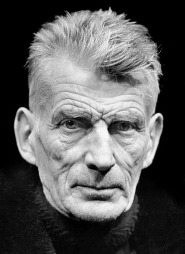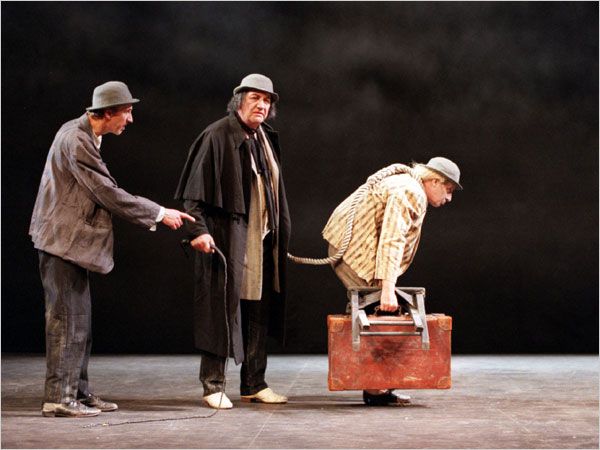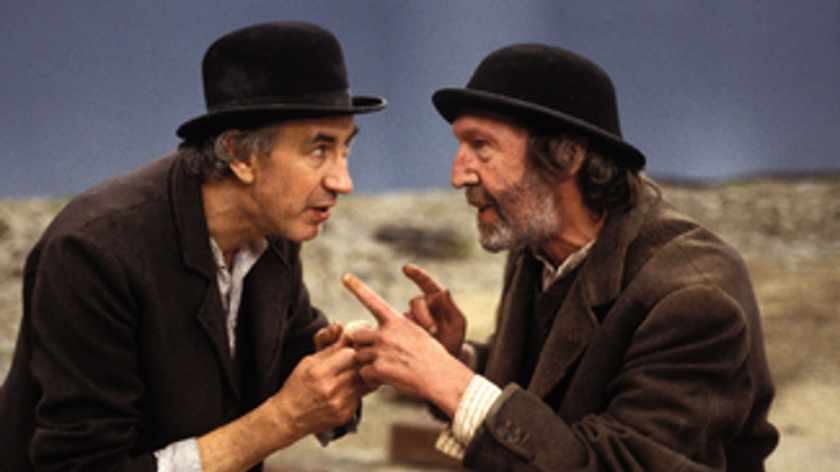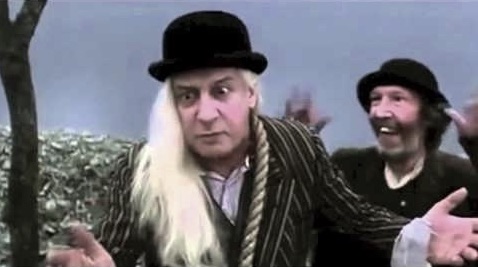 My last article dealt with the meaning that suffuses ‘asemic’ poetry and art. This time I want to reverse that process and ask whether identifiable words can be shorn of their semantic or semic value. I am focusing on Samuel Beckett, and in particular Waiting for Godot.
My last article dealt with the meaning that suffuses ‘asemic’ poetry and art. This time I want to reverse that process and ask whether identifiable words can be shorn of their semantic or semic value. I am focusing on Samuel Beckett, and in particular Waiting for Godot.
Robert Shea and Robert Anton Wilson stated that “true communication is only possible between equals” (9). In Waiting for Godot, equality does not exist among the characters. Of the two down-and-outs, Vladimir usually appears to be the more dominant. Pozzo and Lucky have a master-and-slave relationship, even though it is hinted that Lucky was once Pozzo’s teacher (25). In the first act, Pozzo appears to be Vladimir’s and Estragon’s social superior. When Pozzo is brought low by blindness Lucky has become mute (78); the master-and-slave relationship remains, however. In their fallen state their relationship to Vladimir and Estragon is ambiguous. In Pozzo’s fury there is still something of the injured gentilhomme, but when Vladimir mimics their offstage fall it is almost as though he assumes the role of a superior onlooker (ibid.). In any case, arguably, this lack of equality lays a foundation for the characters’ inability to communicate.
Revision and translation gave Beckett the opportunity to pare meaning. Beckett himself spoke of a “loss” (of meaning perhaps) in translating from French to English (Bair, 485) and of his preference for the 1954 Grove Press edition, which is closer to the final version, over the French-language original (577)[1]. The original title, En Attendant Godot, has the sense of “whilst waiting for Godot”, implying that the play is ‘about’ what happens whilst waiting. It also enables Beckett to play with the sound of words – “on attend Godot” (En Attendant, 8) – “en” and “on” being near homophones in French; the Samuel French version has “We’re waiting for Godot” (Waiting, 5) but the phrase could as easily have been translated as “one waits for Godot”, implying that that is simply what one does, it is one’s fate to wait. Beckett used such puns deliberately. For example the title of his novel Comment c’est, is a pun on the verb “commencer”, “to begin” (Critchley, 123), which was discarded, losing the punning power, on its translation into English as How It Is; by the same token, ambiguous En attendant Godot becomes unambiguous Waiting for Godot, its meaning pared.
More stripping away occurs within the play. In the first act, Vladimir and Estragon indulge in a little small-talk whilst Pozzo searches for his pipe; Colin Duckworth’s introduction (En Attendant, lix) draws attention to the first edition of the play, in which the dialogue ran:
– On se croirait au spectacle.
– Au music-hall.
– Avec Bim et Bom.
– Les comiques staliniens.
The political overtone was struck out and the “Stalinist comedians” became “Russian comedians;” but eventually even the observation that Pozzo and Lucky were like a comic turn was pared away, and what was left was nothing more than one of Vladimir’s and Estragon’s antiphonal, contradictory exchanges, all of which happened under the strict authorial control of Beckett himself:
Vladimir Worse than the pantomime.
Estragon The circus.
Vladimir The music hall.
Estragon The circus.
(Waiting, 26-27)
Likewise his use of the nonsense-word “knook” (25); the explanatory exchange is entirely missing from the English text, and meaning takes yet another backward step.
Vladimir Qu’est-ce que c’est, un knouk?
Pozzo Vous n’êtes pas d’ici. Etes-vous seulement du siècle? Autrefois on avait des bouffons. Maintenant on a des knouks.
(En Attendant, 27)

Throughout the text, no exchange comes to any concrete conclusion, from the smallest, such as the following, which teases critics looking for a Christian interpretation,
Vladimir Suppose we repented.
Estragon Repented what?
Vladimir Oh… (He reflects) We wouldn’t have to go into details.
(Waiting, 3)
to longer passages of dialogue such as the “dead voices” exchange (52-53). This inconclusiveness is another device to pare meaning, as is contradiction. “Let us try and converse calmly,” says Estragon, “since we are incapable of keeping silent” (52), despite which supposed incapability the pair subject themselves to ten protracted silences within the next four pages, the contradiction cancelling out the initial statement. From the point where Estragon suggests conversation, the exchange alters its direction seamlessly:
Vladimir You’re right, we’re inexhaustible.
Estragon It’s so we won’t think.
Vladimir We have that excuse.
Estragon It’s so we won’t hear.
Vladimir We have our reasons.
Estragon All the dead voices.
Vladimir They make a noise like wings.
Estragon Like leaves.
Vladimir Like sand.
Estragon Like leaves.
(ibid.)
This, and the passages punctuated by the first four silences, are actually beautiful, in sprung rhythm – “They listen to the dead voices while we listen to the poetry” (McDonald, 146), but it is poetry to no effect, petering out into more silences broken by Vladimir’s desperate “Say something! […] Say anything at all! […] This is awful! […] Help me!” (Waiting, 53). Eventually they find their flow again, but once more the nature of the exchange is altered, becoming a stichomythia where they intend to contradict each other but, perversely, superficially agree.
Vladimir That prevents you from thinking.
Estragon You think all the same.
Vladimir No, no, impossible.
Estragon That’s the idea, let’s contradict each other.
Vladimir Impossible.
Estragon You think so?
Vladimir We’re in no danger of ever thinking any more.
Estragon Then what are we complaining about?
(ibid.)

At last their exchange becomes nonsensical:
Estragon We should turn resolutely towards nature.
Vladimir We’ve tried that.
Estragon True.
Vladimir Oh, it’s not the worst, I know.
Estragon What?
Vladimir To have thought.
Estragon Obviously.
Vladimir But we could have done without it.
Estragon Que voulez-vous?
Vladimir I beg your pardon?
Estragon Que voulez-vous?
Vladimir Ah! que voulez-vous. Exactly.
(54)
Estragon’s assessment is “That wasn’t a bad little canter” (ibid.), indicating that the exchange was intended to pass the time, “so we won’t think […] so we won’t hear” (52). Words normally express thoughts, spoken words are understood by hearing them, so when they are used to prevent thought and hearing and merely to expend time, they are robbed completely of meaning.
Lucky’s declamation (34-36) seems to introduce many of what commentators assume to be themes of the play, but does so incoherently. No thought, throughout the passage, reaches any rational or grammatical conclusion, it becomes “an incoherent Jeremiad” (Coe, 1), and the other characters throw themselves upon him, actively preventing any chance of communication. Suman Gupta suggests that it could be nothing but nonsense:
[It] is so clearly designed to defeat clear construction and sequential development that one cannot help feeling that to try to interpret it is to distort its effect. I do not think that Lucky’s speech is open to any single conclusive interpretation of an argument or a structure – it would well be taken as nonsense.
(241)
Not only nonsense but mockery of sense, perhaps. Lucky’s “quaquaquaqua” (Waiting, 34) mocks his master’s “Qua sky” (29). The fact that his rant seems to flow is of no significance; so did the “big thinks” of Doctor Moreau’s monkey-man (Wells, 178), so did the “quack-quack-quacking” of the “duckspeaker” (Orwell, 57), and so will the “quaqua” in Bom’s thoughts (How It Is, 3, 109, 127). Lucky’s scatological “Acacacacademy” and “Anthropopopometry” are akin to the “sex” sound in Finnegan’s subconscious “Exexex! COMMUNICATED!” (Joyce, 172). None of these makes actual ‘sense’ any more than Lucky’s speech does.

Beckett illustrates how the meaning of a single word can be imperiled in repetition. The blind Pozzo calls for help some eighteen times (Waiting, 67-73), most often with that specific, single word. Vladimir and Estragon effectively ignore it, arguing over his identity, speculating about Godot, falling over themselves, and so on. The fact that they eventually say almost seems to be divorced from his cries for help up to that point.
Vladimir What about helping him?
Estragon What does he want?
Vladimir He wants to get up.
Estragon Then why doesn’t he?
Vladimir He wants us to help him to get up.
Estragon Then why don’t we? What are we waiting for?
(73)
Perhaps the most telling examples of the inability to communicate come in the last minutes of the play. In the final exchange between Vladimir and the boy (80), the boy actually communicates nothing. Vladimir supplies his own ready-made assumptions. It is impossible to know whether they are in fact correct – the boy’s affirmations are not necessarily to be trusted. We are left with the feeling that if Vladimir had said instead that Godot was on his way and would be there at any minute, the boy would still have answered ‘Yes, sir’, that Vladimir’s assumptions either way are arbitrary and would not affect whether Godot would come. The limits that Vladimir puts on the outcome are delusional, products perhaps of existentialist dread, but as meaningless as the words themselves.
The final exchange and stage direction bring non-communication to a poignant conclusion:
Vladimir Well? Shall we go?
Estragon Yes, let’s go.
They do not move
(83)
Where words bear no relation to action, they have no meaning at all. In each of the characters’ lines the operative verb is “go,” and yet “they do not move;” these words, then, have no meaning, nothing is communicated, thus nothingness is communicated. This divorce of words and action could therefore be said to expand the quip that in Waiting for Godot “nothing happens, twice” (Mercier, 9) to “nothing is communicated, twice”. This may well be a challenge to theatrical convention, and Suman Gupta repeatedly makes the point that “[p]lays that question theatrical conventions and compel renegotiation and readjustment from the audience are inevitably, therefore, about theatre […]” (218). However, it is possible to contradict Gupta by simply considering statements made by Beckett himself: “I’m not interested in the theatre […] I’m not interested in the effect my plays have on the audience. I simply produce an object. What people think of it is not my concern.” (Duckworth, 17).
If Waiting for Godot is not ‘theatre about theatre’, it is easy to argue that it is about nothing, or “nothingness,” conveyed by the deliberately non-communicative dialogue. It is the “object” created when Beckett realizes that “[…] more and more my own language appears to me like a veil that must be torn apart in order to get at the things (or the Nothingness) behind it” (Gupta, 232). For Beckett “words are the chief ingredient of failure” (Coe, 11) and “the only certain answer is that there is no answer” (93) – perhaps the only certain answer being uncertainty itself.
Where does this leave my own dictum that “we read everything” then? (Thompson)
The challenge for the images I cited in my previous article, and for those like them, is that we cannot help but grant them semic content. For all the ostensibly semic and semantic value, for all the sense that each sentence might make in the play, Waiting for Godot challenges us by making that value slip away, so that we question anything semantic or semic even if we attribute it ourselves. I can’t claim that Beckett actually pulls this off, this trick on us, but if he fails in Godot, he goes on to “fail better” (Worstward Ho, 7) in works like Sans, where he uses a smaller and smaller lexicon to express changelessness, endlessness, and the annihilation of time – perhaps a subject for a further article.
Footnote:
[1] I’m sorry to have to ask you to read carefully – the original text of Waiting for Godot was, of course, in French, and the version I am mainly referring to in this article is published by Samuel French. I have had to read it over a few times myself to be sure I know what I’m saying – an objective lesson in the perils to meaning!
Editorial note:
Images with this article are from various stagings of Waiting for Godot by the Gate Theatre, Dublin.
__________
Works cited:
Bair, Deirdre. Samuel Beckett: a biography. Summit, 1990.
Beckett, Samuel. En Attendant Godot. Ed. Colin Duckworth, George G.
Harrap & Co., 1966.
—. How It Is. Faber & Faber 2009.
—. Waiting for Godot. Samuel French, 2004.
—. Worstward Ho. John Calder, 1983.
Coe, Richard N. Beckett. Oliver & Boyd, 1964.
Critchley, Simon. “Who Speaks in the Work of Samuel Beckett?” Yale
French Studies, No.93, pp.114-130. tinyurl.com/SCBeckett. Accessed
21st January 2019.
Duckworth, Colin. Angels of Darkness: dramatic effect in Samuel Beckett
with special reference to Eugène Ionesco. Allen and Unwin, 1972.
Gupta, Suman. “Samuel Beckett, Waiting for Godot.” The Popular & The
Canonical: Debating Twentieth-Century Literature 1940-2000, ed.
David Johnson, Routledge, pp.210-261, 2005.
Joyce, James. Finnegans Wake. Oxford World Classics, Oxford UP, 2012.
McDonald, Ronan. Tragedy and Irish Literature: Synge, O’Casey, Beckett.
Palgrave, 2002.
Mercier, Vivian. “The Uneventful Event.” The Irish Times, 18th February
1956, p.6. tinyurl.com/MercierGodot. Accessed 21st January 2019.
Orwell, George. Nineteen Eighty-four. Harmondsworth, Penguin, 1990.
Shea, Robert, & Robert Anton Wilson. The Golden Apple. Sphere, 1976.
Thompson, Paul. “Image and meaning: some thoughts on the term
‘asemic’.” Taxonomy Domine 10th January 2019.
tinyurl.com/Asemic. Accessed 21st January 2019.
Wells, Herbert George. The Island of Doctor Moreau. Harmondsworth,
Penguin, 1964.
